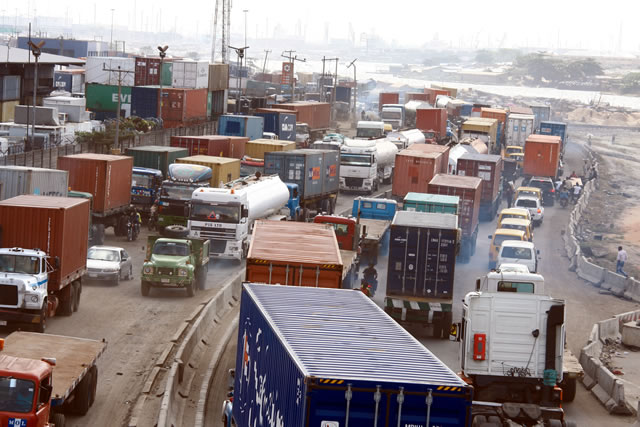Truck Holding Bay As Panacea To Apapa Gridlock
By David Oladimeji
The trucking business in Apapa has become a nightmare due to failure on the part of the government regulatory agencies to have the political will to compel shipping companies to make provisions for holding bays for the purpose of receiving their empty containers.
Today, transport sector accounts for about 70% of the Nigerian economy and it is next to the government in terms of employment of labor. It is also a major means of distribution of goods and services across the country.
However, it is very painful when those that know the cause or they are even the cause as they are beneficiaries of the problems in the ports. They always push the blames to the innocent truck drivers and their owners as the causes of the traffic gridlock.
There is no provision for empty containers stacking holding bays by the shipping companies outside the ports which have invariably affected many economic developments. Many businesses have closed down, their staffers have been thrown out to the streets and trucks have also been turned to the major roads such as Apapa, Ijora, Ikorodu, and Tin can, Mile 2, Oshodi Expressway, Eko Bridge, streets in Ajegunle, and Kirikiri Town with their empty containers. The truck drivers are facing a lot of challenges such as stress due to loss of man-hour, intimidation, incessant harassment which has resulted to the death of about 10 of such drivers on queue this year. Equally, our investment has also been exposed to so many hazards in the hands of security agencies, community leaders and hoodlums.
Just recently, the state Chairman of the National Association of Transport Owners (NARTO) said at a parley, organized by the Maritime journalists association of Nigeria, ( MAJAN) Alhaji Abdullahi M. Inuwa said: “We expected the government regulatory agencies in the ports to enforce the implementation of some of the directives given to the shipping companies’ years back as attached to avoid this ugly and unacceptable situation but to no avail as the shipping companies manipulated their ways”.
In the original master plan of the ports, there is provision for basic amenities such as truck packing space, empty container stacking area and sheds. But after the port concession, concession, all these basic amenities were tampered with, without considering their importance and also forgot that in any country, road transport plays a vital a vital role in the development of the country’s economy. Be it air, sea or rail, transportation must still go through the road as it is the major means of conveyance and distribution to the final destination. In the global trade, about 90% of cargo is being transported by the sea of which about 70% is containerized. Only Apapa port was linked with railway line. However, out of 70% of the containerized cargoes, 67% are being transported out of the ports by trucks even as the containers must be returned to the shipping companies from the port or be charged to pay demurrage to the shipping companies for delay on arrival.
During the commencement of the port concession, truck drivers usually drop the empty containers at various holding bays owned by shipping companies to get entry into the ports on request for shipping through the services of hired trucks or their company’s trucks, if any.
Within that period, when they began to realize that volumes of cargoes into the country’s seaports are increasing, they started transferring some import containers to bonded terminals. That development helped a lot in reducing pressure of inflow coming to the ports as many trucks were directed to pick up the cargoes from bonded terminal but today, more than 15 bonded terminals are empty.
The Nigerian Ports Authority management cannot in any way shy away from this terrible situation of traffic gridlocks. Formally, there was a joint committee that comprised of NPA, shipping companies, transport associations and unions that went round to inspect the functionality of those holding bays but since then shipping companies manipulated their ways by abandoning the use of those holding bays and decided to be receiving the empty containers directly to the ports for their selfish interest and greed.
As they abandoned the use of their holding bays under the watchful eyes of the regulatory agencies out of greed to make more profit by cutting expenses , cost of handling equipment, holding bays and transportation charge that could have been paid by them if maintained , thus , mark the beginning of the congestion that leads to the constant traffic bottleneck in the ports while shipping companies and terminal operators are busy feeding fat from importers, agents and truck owners for demurrage money that are being paid for empty containers and import containers that were trapped due to the traffic gridlocks in the ports environment.



Comments are closed.